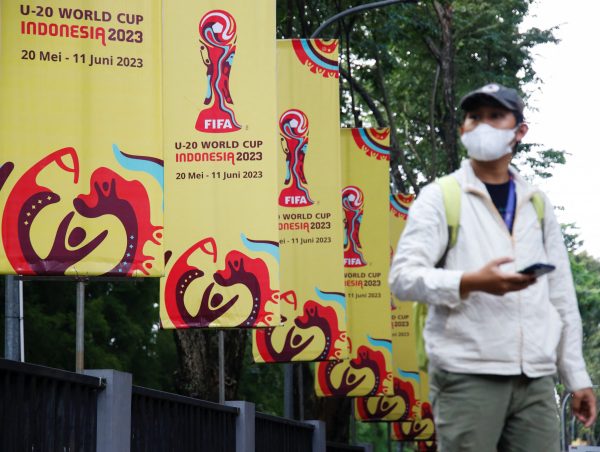FIFA’s cancellation of Indonesia’s right to host the 2023 U-20 World Cup amid domestic controversy over the participation of Israel’s under-20s team has cost the Indonesian economy millions in lost economic activity, deprived a multitude of Indonesian soccer fans of a chance to see their country host its first FIFA tournament, and wedged the political coalition behind President Joko Widodo’s government — not to mention having done nothing meaningful to advance justice for the Palestinian people.
Indonesia’s playing host to the U-20 was supposed to be a boon for tourism as the economy recovers from the pandemic. Tourism Minister Sandiaga Uno reckons the industry is set for US$247 million in losses. It’s also a lost opportunity for a good-news story about Indonesia’s huge soccer scene, less than a year after 135 people were killed at a stadium in East Java when a heavy-handed police response to an unruly crowd triggered a stampede.
Objections to Israel’s participation came from opposite ends of Indonesia’s political spectrum, most predictably from the anti-government Islamic right who argued that the participation of Israel violated Indonesia’s pro-Palestinian diplomatic position and offended the sensibility of Muslims. This was hardly enough to put the government on the defensive: mainstream Islamic organisations close to the administration, and even the Palestinian ambassador to Indonesia, were supportive of the long-planned tournament going ahead with Israel competing.
What electrified the issue politically was objection to Israeli participation — on ostensibly anti-colonial grounds — from the nationalist PDI-P party to which President Widodo is affiliated. Party chairwoman and former president Megawati Soekarnoputri had quietly ordered local leaders from her party to oppose the Israeli team’s involvement. One of those local leaders happens to be Ganjar Pranowo, the Central Java governor who was widely considered the frontrunner to win the February 2024 presidential race. With Ganjar trying to prove his bona fides as a reliable servant of PDI-P as he seeks the party’s presidential nomination, he duly fell into step with the party line, loudly opposing letting the Israeli team play.
Ganjar has passed Megawati’s loyalty test, though at the cost of his own standing among voters — and with President Widodo, who is keen to see a friendly figure win the 2024 race, and whose government defended the inclusion of Israel in the tournament until FIFA got cold feet. A poll taken after the U-20’s cancellation shows a significant drop in Ganjar’s popularity. No longer the frontrunner, Ganjar now narrowly trails an electorally resurgent Defence Minister Prabowo Subianto — just as Widodo is said to be growing warmer on the idea of seeing Prabowo, his opponent in the 2014 and 2019 elections, succeed him in 2024. PDI-P, which has been sounding out Prabowo on the idea of a unity ticket, now continues coalition negotiations with its candidate and its bargaining position substantially weakened.
Besides introducing a note of uncertainty into the race for the presidency, the FIFA debacle also confirms one reality of Widodo-era politics: that the President’s relationship with his own party, PDI-P, remains tense and transactional at best. From the moment Widodo became President, Megawati resented what she saw as the President’s ingratitude for her patronage and his resistance to her demands for control over policy and personnel decisions. The split between the government and the PDI-P over the World Cup shows how much he and his party’s interests have diverged over the course of his presidency as he built an independent power base among the electorate and now within the bureaucracy and security sector agencies, where pro-Widodo factions sometimes do political battle with those aligned with PDI-P and Megawati.
This typically occurs behind the scenes. What’s novel about the U20 controversy is that it represents a relatively rare case of the President being drawn a policy fight with PDI-P and being very publicly defeated, albeit to the likely electoral disadvantage of the party not so much to him personally. Widodo’s approval rating still hovers around the 75 per cent mark. PDI-P has scored a pyrrhic victory in displaying its willingness to assert influence for its own sake, in this case by subjecting Ganjar to a loyalty test that it feels that Widodo has failed as he pursued his own political interests and policy priorities as President.
If there’s a silver lining to this fiasco, it is what it has revealed about the pragmatism of the Indonesian public. In the aftermath of the tournament’s cancellation, the discussion hasn’t been dominated by triumphalism about the sacrifices made in the name of showing solidarity with Palestine, but rather the economic benefits that have been lost, and the missed opportunity for the international spotlight to shine positively on Indonesia.
As the Indonesian foreign policy researcher Andrew Mantong recently reminded Western audiences, ‘[s]imply looking at Indonesia as a “Muslim-majority country” is not sufficient to explain attitudes to the world beyond Indonesia’s borders’. Indonesian elites have made that mistake to the extent that they saw electoral advantage making, or responding to, calls for Israel’s exclusion even if that threatened the viability of the U20 itself.
Even in an Indonesia where voters are growing more self-consciously Islamic, the politics of the nation can still trump those of religion.
Liam Gammon is a Research Fellow in the East Asian Bureau of Economic Research at The Australian National University.

